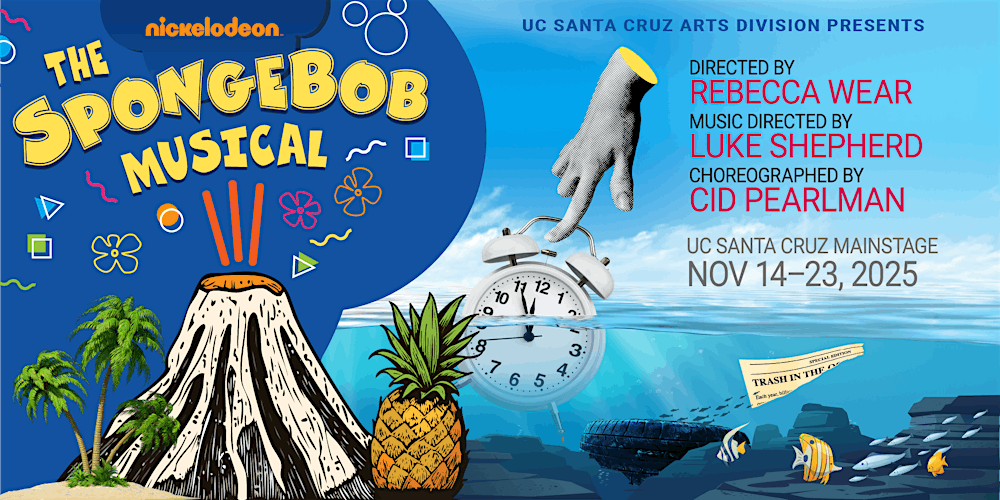
News/Events
Arts Division Event Highlights
UCSC News
 Arts
Arts
Porter alum Cuauhtemoc Martinez and a life in sound
From East Los Angeles to UC Santa Cruz to leading sound production at Warner Bros., Porter alum Cuauhtemoc Martinez has built a life in sound.
 Arts, Performance, Play & Design
Arts, Performance, Play & Design
SpongeBob Squarepants musical serves up family fun alongside key social and environmental themes
UC Santa Cruz’s version of the production opens Nov. 14 at the Theater Arts Mainstage
 Arts, Music
Arts, Music
Korean Experimental Music Festival bridges musical divides across cultures and styles
National Gugak Center and Del Sol string quartet join forces with faculty and students from UC Santa Cruz and other Bay Area universities to perform daring new compositions
Featured In The News
-
A Postcard from the Festival of Monsters
In October 2025, humanistic scholars of things spine-tingling, sinister, and spectacular descended on seaside Santa Cruz for the Festival of Monsters, an academic conference presented by the Center for Monster Studies at the University of California, Santa Cruz. In addition to the academic proceedings, the Festival connected…
Division News
-

Arts Division Welcomes New Faculty Members
-

Shaping tomorrow’s visionaries: local high school students experience Art for All at UC Santa Cruz’s Institute of the Arts and Sciences
-

These six documentaries are bringing social issues to light
-

UC Santa Cruz foundry marks 50 years with bronze pour and celebration of legacy
Featured Faculty
-

Arts Division Welcomes New Faculty Members
-

UC Santa Cruz Division of Undergraduate Education appoints Soraya Murray as new Provost of Porter College
-

John Jota Leaños selected as new Interim Dean of Diversity, Equity and Inclusion for the UC Santa Cruz Arts Division
-

Campus secures funding for innovative research projects addressing climate action and linguistic diversity
Featured Alumni
Featured Students
Featured Staff

Stay in touch
Arts Division Newsletter
Newsletter Archive
- May 22, 2025
- Fond Farewell | Joyful Graduations
- April 23, 2025
- Welcome to Spring!
- March 18, 2025
- Dean Celine’s Important News | Sesnon Gallery Acquisition | Spring Events….and More!
- February 24, 2025
- Grad Slam | Arts Events…and more!
- January 23, 2025
- Welcome to the New Year! | SO TO SPEAK Premieres | Arts Events…and more!
- December 6, 2024
- Ken Corday’ Piano Donation | Squiggle Turns 50 | Arts Events & More
- November 21, 2024
- Dean Celine on New AAPI Council | Fall Season Events, and More
- October 2024
- Welcome to the New Academic Year! | FDM Celebrates 25 Years | New AI Lab
- May 23, 2024
- Iolanthe | Print Sale’s 50th | Spring Events & More…
- April 24, 2024
- Spring Events | Student Exhibitions | And more…
- March 20, 2024
- Dean’s Book Launch | AGPM in Top Rankings | Spring Events
- February 22, 2024
- Arts Retreat | Grad Slam | Upcoming Events and Much More
- January 26, 2024
- Welcome to the New Year in the Arts!
- December 13, 2023
- Bittersweet Holidays | Gratitude to Rowland Rebele | Arts News
- November 15, 2023
- KEN CORDAY on 11/17 and CONVOCATION on 11/29
- October 12, 2023
- Welcome to Fall in the Arts!
- May 23, 2023
- The Little Prince | AATAT Story Wins Murrow Award | Many Live Events on Campus…and More!
- April 25, 2023
- FDM Professors Awarded Guggenheims | Sir Isaac Julien at the Tate | Spring Events…and more!
- March 20, 2023
- Charles Hamilton in Jazz Hall of Fame, 80 Years Later Gets SF Honor, and much more!
- February 15, 2023
- PIPELINE Opens 2/24 | Patty Gallagher in LITTLE HEART | And much more…
- December 2, 2022
- October 26, 2022
- June 10, 2022
- May 26, 2022
- April 29, 2022
- March 28, 2022
- February 22, 2022
- January 13, 2022
- December 10, 2021
- November 16, 2021
- October 6, 2021
The Art of Change Podcast
Take a look at the latest news and events happening throughout the Arts Division at UC Santa Cruz.





























